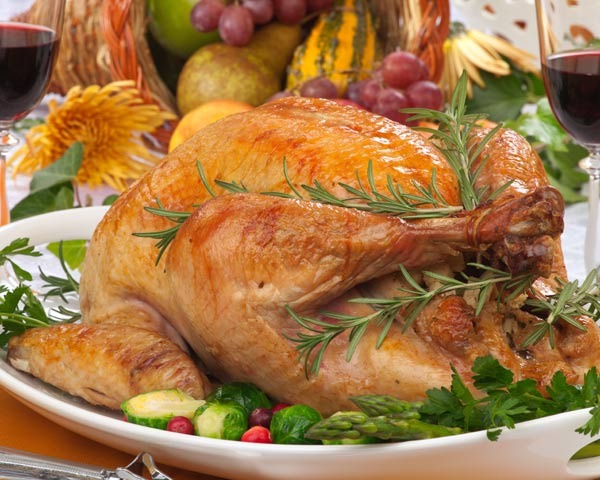What You Need To Know About Cooking Thanksgiving Turkey
With Thanksgiving quickly approaching, cooks across the country are finalizing their menus and preparing for the marathon meal. The pinnacle of the Thanksgiving meal is, of course, the turkey — and we want to make sure that you are fully equipped and prepared to cook it just right. Don't get wrapped up in Turkey Day chaos. Take a deep breath, relax, and follow some of these easy tips to cook a fantastic turkey.
Click here to see the How to Fry a Turkey for Thanksgiving (Slideshow)
The first step is to brine your fresh (not frozen) turkey. This involves soaking the turkey in a salty solution long enough for the salt to infiltrate the flesh, resulting in a juicer and tastier turkey. You can buy ready-made brining solutions or make your own. First, remove the innards (you can save these to make a broth for the stuffing: put into a saucepan, cover with water, add salt, and simmer for about an hour). Place the turkey (breast side down) into the brine solution, making sure the cavity gets filled. Place in a brining bag, seal tightly, and place in the refrigerator overnight.
Remember to handle raw turkey with caution. Be sure to always use separate cutting boards and utensils and avoid contact with other foods. Wash your hands with soap and warm water before touching anything else.
An hour before roasting, take the turkey out of the refrigerator and place in the roasting pan to dry and take the chill off the meat. This helps the turkey cook faster and promotes even browning and crisping.
Since stuffing your turkey adds cooking time, we opt to stuff with aromatics instead. Stuff the inside of the turkey with half an onion (peeled and quartered), lemon halves, a few smashed garlic cloves, and herbs like parsley, sage, rosemary, and thyme. Rub the skin with melted butter or olive oil and sprinkle with black pepper (omit salt because it has been brined). Truss your turkey by tying the legs together with kitchen string and tucking the wing tips under.
Roast the turkey at 500 degrees for 30 minutes. Then cover the breast area with aluminum foil, reduce heat to 350 degrees, add 2 cups of water or broth to the roasting pan, and cook until the internal temperature reaches 165 degrees. The rule of thumb is about 13 minutes per pound. Baste frequently, to promote even browning, but be sure to keep the oven door shut in between basting so the heat doesn't escape.
When the turkey has reached the desired temperature, remove from the oven, and tilt the bird so the inside liquids run out into the pan. Lift the whole turkey and transfer to a clean cutting board. Tent the turkey with foil and let it rest for 30 minutes before carving. Reserve the drippings for the gravy.
For the gravy, transfer the drippings to a saucepan and ladle off any excess fat. In a separate bowl, whisk together cornstarch and water (just enough so the cornstarch is absorbed), and stir into drippings. Stir constantly until the mixture thickens. Season the gravy with salt, pepper, and herbs to taste.
So, there you have it — one moist, juicy, and tender turkey. Follow these simple tips to cook one delicious turkey.
Emily Jacobs is the Recipe editor at The Daily Meal. Follow her on Twitter @EmilyRecipes.
For more turkey talk, head over to The Daily Meal's Guide to Thanksgiving
